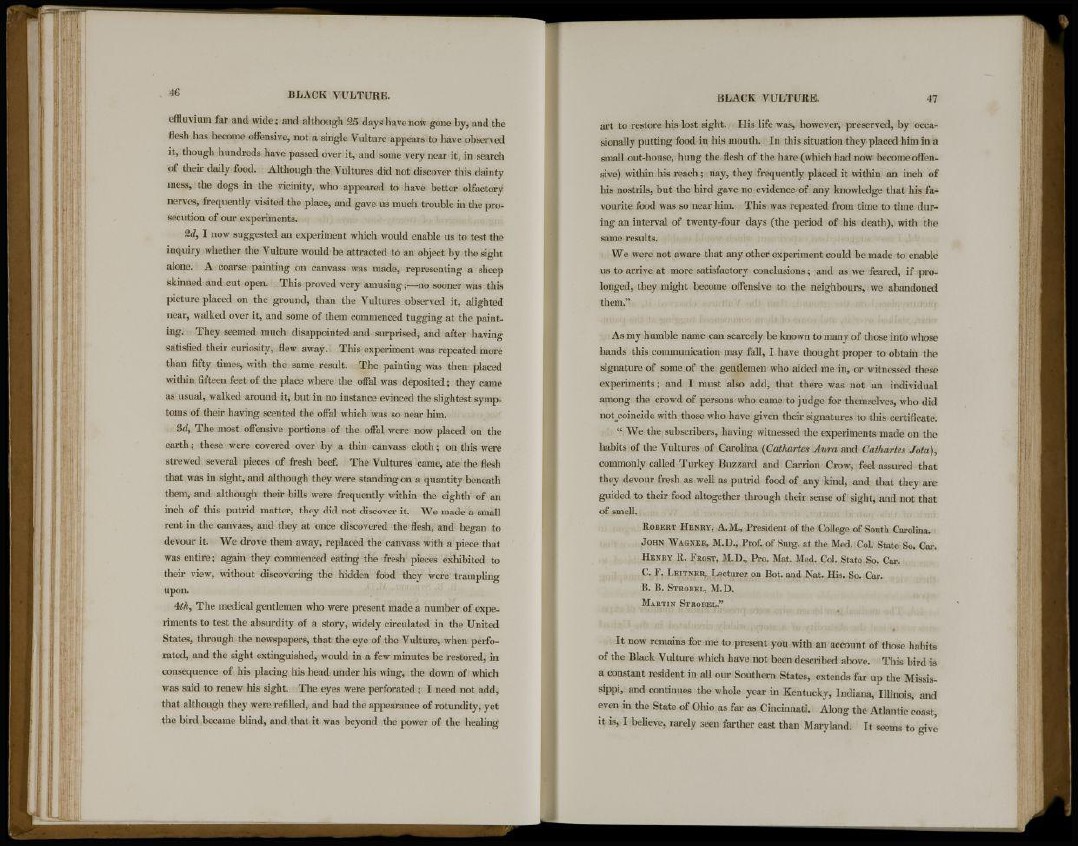
effluvium far and wide; and although 25 days have now gone by, and the
flesh has become offensive, not a single Vulture appears to have observed
it, though hundreds have passed over it, and some very near it, in search
of their daily food. Although the Vultures did not discover this dainty
mess, the dogs in the vicinity, who appeared to have better olfactory
nerves, frequently visited the place, and gave us much trouble in the prosecution
of our experiments.
&7, I now suggested an experiment which would enable us to test the
inquiry whether the Vulture would be attracted to an object by the sight
alone. A coarse painting on canvass was made, representing a sheep
skinned and cut open. This proved very amusing;—no sooner was this
picture placed on the ground, than the Vultures observed it, alighted
near, walked over it, and some of them commenced tugging at the painting.
They seemed much disappointed and surprised, and after having
satisfied their curiosity, flew away. This experiment was repeated more
than fifty times, with the same result. The painting was then placed
within fifteen feet of the place where the offal was deposited; they came
as usual, walked around it, but in no instance evinced the slightest symptoms
of their having scented the offal which was so near him.
3d, The most offensive portions of the offal were now placed on the
earth; these were covered over by a thin canvass cloth; on this were
strewed several pieces of fresh beef. The Vultures came, ate the flesh
that was in sight, and although they were standing on a quantity beneath
them, and although their bills were frequently within the eighth of an
inch of this putrid matter, they did not discover it. We made a small
rent in the canvass, and they at once discovered the flesh, and began to
devour it. We drove them away, replaced the canvass with a piece that
was entire; again they commenced eating the fresh pieces exhibited to
their view, without discovering the hidden food they were trampling
upon.
4>th, The medical gentlemen who were present made a number of experiments
to test the absurdity of a story, widely circulated in the United
States, through the newspapers, that the eye of the Vulture, when perforated,
and the sight extinguished, would in a few minutes be restored, in
consequence of his placing his head under his wing, the down of which
was said to renew his sight. The eyes were perforated; I need not add,
that although they were refilled, and had the appearance of rotundity, yet
the bird became blind, and that it was beyond the power of the healing
art to restore his lost sight. His life was, however, preserved, by occasionally
putting food in his mouth. In this situation they placed him in a
small out-house, hung the flesh of the hare (which had now become offensive)
within his reach; nay, they frequently placed it within an inch of
his nostrils, but the bird gave no evidence of any knowledge that his favourite
food was so near him. This was repeated from time to time during
an interval of twenty-four days (the period of his death), with the
same results.
We were not aware that any other experiment could be made to enable
us to arrive at more satisfactory conclusions; and as we feared, if prolonged,
they might become offensive to the neighbours, we abandoned
them."
As my humble name can scarcely be known to many of those into whose
hands this communication may fall, I have thought proper to obtain the
signature of some of the gentlemen who aided me in, or witnessed these
experiments; and I must also add, that there was not an individual
among the crowd of persons who came to judge for themselves, who did
not^coincide with those who have given their signatures to this certificate.
" We the subscribers, having witnessed the experiments made on the
habits of the Vultures of Carolina (Catliartes Aura and Cathartes Jota),
commonly called Turkey Buzzard and Carrion Crow, feel assured that
they devour fresh as well as putrid food of any kind, and that they are
guided to their food altogether through their sense of sight, and not that
of smell.
ROBERT HENRY, A. M., President of the College of South Carolina.
JOHN WAGNER, M.D., Prof, of Surg, at the Med. Col. State So. Car.
HENRY R . FROST, M.D., Pro. Mat. Med. Col. State So. Car.
C. F . LEITNER, Lecturer on Bot. and Nat. His. So. Car.
B. B. STROBEL, M.D.
MARTIN STROBEL."
It now remains for me to present you with an account of those habits
of the Black Vulture which have not been described above. This bird is
a constant resident in all our Southern States, extends far up the Mississippi,
and continues the whole year in Kentucky, Indiana, Illinois, and
even in the State of Ohio as far as Cincinnati. Along the Atlantic coast,
it is, I believe, rarely seen farther east than Maryland. It seems to give